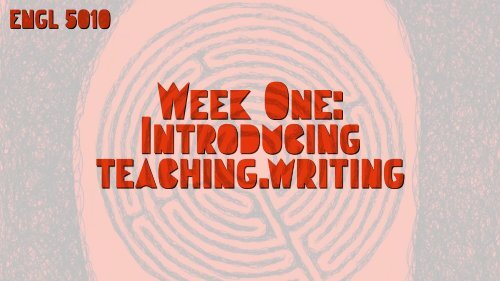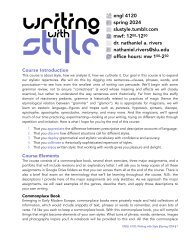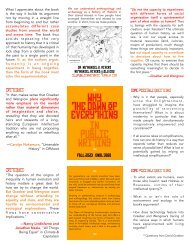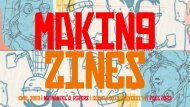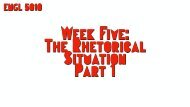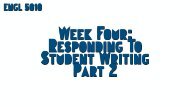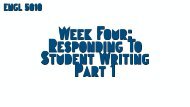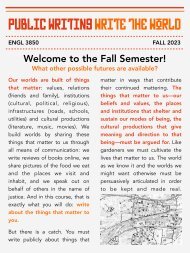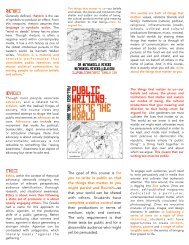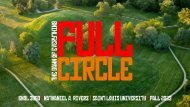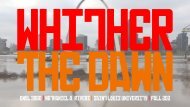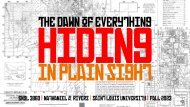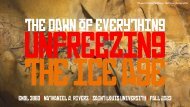Create successful ePaper yourself
Turn your PDF publications into a flip-book with our unique Google optimized e-Paper software.
<strong>ENGL</strong> <strong>5010</strong><br />
<strong>Week</strong> <strong>One</strong>:<br />
Introducing<br />
teaching.writing
<strong>ENGL</strong> <strong>5010</strong><br />
We will practice what is it teach and what is it to learn. This<br />
exploration will of necessity be far reaching: any discussion of<br />
teaching and learning is also a discussion of environment,<br />
embodiment, and cognition. Sociality and identity are also<br />
present and at stake here. How do we come to know both<br />
our worlds and ourselves; how can we come to help<br />
others know themselves and their worlds?
<strong>ENGL</strong> <strong>5010</strong><br />
This seminar has three primary goals:<br />
1. prepare you to teach English 1900 in SLU’s<br />
Writing Program<br />
2. cultivate you as a university-level teacher<br />
3. enculturate you into the field of rhetoric and<br />
composition
<strong>ENGL</strong> <strong>5010</strong><br />
We will primarily meet these goals by attentively working through the<br />
major assignments of English 1900 itself. The best way for someone<br />
to learn to teach the course is to actually try it and see how it works. <br />
Additionally, we will achieve these goals via a number of means: <br />
• reading pedagogical, theoretical, and student texts<br />
• writing, collectively and individually, in response to this reading<br />
• discussing key concepts, ideas, and themes<br />
• practicing responses to actual student texts<br />
• meeting with the instructor to discuss progress
<strong>ENGL</strong> <strong>5010</strong><br />
By the end of the course, we will have achieved the<br />
following outcomes. You will be able to: <br />
• prepare your own adapted version of English 1900<br />
• justify it theoretically, both in writing and in speaking <br />
• plan and deliver lessons and writing assignments<br />
• respond formatively and summatively to student writing
<strong>ENGL</strong> <strong>5010</strong><br />
Social Annotation<br />
We share our thoughts on course readings by using<br />
hypothes.is, an online annotation application. Annotations<br />
vary from person-to-person, but our overriding goal is to<br />
share reactions, questions, interests, and dis/beliefs through<br />
annotating our readings together. Annotations take the form<br />
of comments, questions, intra- and inter-connections, and<br />
links. Annotations, crucially, add to the readings.
<strong>ENGL</strong> <strong>5010</strong><br />
Research Binder<br />
At the conclusion of this course, you submit a research binder. This binder<br />
includes every piece of paper you generate over the course of the<br />
semester. The binder is thus a living archive. As an archive, it should have<br />
an organizational scheme that makes it accessible to both you and your<br />
instructor. Individual entries should be dated and described (e.g., quiz,<br />
reading-journal, notes, etc.). In addition to labeling individual entries, the<br />
binder itself should be organized in a coherent, compelling and accessible<br />
way. As an archive, it should trace the work of cultivating yourself as a<br />
teacher.
<strong>ENGL</strong> <strong>5010</strong><br />
Research Binder<br />
Annotations (after class)<br />
What Aristotle means is that the<br />
rhetorician can see how people might<br />
think through possibilities specific<br />
situation. <br />
Every situation is different, a different<br />
context and a different audience. So the<br />
way you talk about something will be<br />
different in those different situations.<br />
Rhetoric doesnt deal with universal<br />
problems…it deals with specific<br />
problems.<br />
I have to ask about this tomorrow!!!<br />
August 28, 2019<br />
Notes (in class)<br />
Available Means: Rhetoric is the ability to see the available means<br />
of persuasion in every given case<br />
Aristotle: Greek philosopher 384-322. Came up with idea of<br />
available means. <br />
Connotation vs. denotation: connotation is how a word feels;<br />
denotation is what a word means. <br />
● School vs. education…one has a more sophisticated connotation. <br />
● Romance vs. relationship…they can refer to the same thing,<br />
but the words will have different feelings, different attitudes.
<strong>ENGL</strong> <strong>5010</strong><br />
There is a profound ethical component to<br />
teaching. The word educate, etymologically, is to<br />
lead out, to draw out, to bring forth. We will thus<br />
ask to where are we leading them, what are we<br />
drawing out, and who are we bringing forth?
Labyrinth<br />
Maze
Ingold 131<br />
Technically, the maze differs from the labyrinth in that it offers not<br />
one path but multiple choices, of which each may be freely made<br />
but most lead to dead ends. It also differs, however, in that its<br />
avenues are demarcated by barriers which obstruct any view other<br />
than the way immediately ahead. The maze, then, does not open<br />
up to the world, as the labyrinth does. On the contrary, it<br />
encloses, trapping its inmates within the false antinomy of freedom<br />
and necessity.
Ingold 132<br />
The maze puts all the emphasis on the traveller’s<br />
intentions. He has an aim in mind, a projected destination<br />
or horizon of expectations, a perspective to obtain, and is<br />
determined to reach it. This overarching aim may, of course,<br />
be broken down into a number of subsidiary objectives.<br />
And it may also be complicated by all the other, competing<br />
aims that assail him from all sides.
Ingold 132-33<br />
The path-follower has no objective save to carry on, to keep<br />
on going. But to do so, his action must be closely and<br />
continually coupled with his perception. Lest he lose the way, he<br />
should be ever vigilant to the path as it unfolds before him. He<br />
has to watch his step, and to listen and feel as well. He must, in a<br />
word, pay attention to things, and adjust his gait accordingly.<br />
Path-following is thus not so much intentional as attentional.
Ingold 133<br />
But for the wayfarer in the labyrinth,<br />
following the trail is a task which, like<br />
life itself, he is compelled to undergo;<br />
his doings—those moments of<br />
perception and action through which<br />
his movement is carried on—are thus<br />
framed within this undergoing.
Ingold 134<br />
A variant etymology, however, traces the word to<br />
educere, from ex (out) plus ducere (to lead). In this<br />
sense, education is a matter of leading novices<br />
out into the world rather than—as it is<br />
conventionally taken to be today—instilling<br />
knowledge in to their minds.
Ingold 135-36<br />
Rather, perception proceeds along what he called a path<br />
of observation. As the observer goes on his way, the<br />
pattern in the light reaching the eyes from reflecting<br />
surfaces in the environment (that is, the ‘optic array’) is<br />
subject to continual modulation, and from the underlying<br />
invariants of this modulation, things disclose themselves for<br />
what they are.
Ingold 136<br />
Or more precisely [things] disclose what they afford, in so far<br />
as they help or hinder the observer in keeping going, or in<br />
carrying on along a certain line of activity. The more practised<br />
we become in walking these paths of observation,<br />
according to Gibson, the better able we are to notice and to<br />
respond fluently to salient aspects of our environment. That<br />
is to say, we undergo an “education of attention.”
Ingold 136<br />
It is not, then, that the walker’s attention is<br />
being educated; rather the reverse: his<br />
education is rendered attentive, opened<br />
up in readiness for the ‘not yet’ of what is<br />
to come.
Readings<br />
153<br />
By the decentering of the pedagogic situation I mean to<br />
insist that teaching is not best understood from the point of<br />
view of a sovereign subject that takes itself to be the sole<br />
guarantor of the meaning of that process, whether than<br />
subject is the student, the teacher, or the administrator.<br />
Decentering teaching begins with an attention to the<br />
pragmatic scene of teaching.
Robinson (2010)<br />
RSA
Readings<br />
154<br />
I want to suggest, however, that pedagogy<br />
also can be understood otherwise: other<br />
than as the inculcation or revelation of<br />
an inherent human autonomy, other than<br />
as the productive of sovereign subjects.
Readings<br />
162-63<br />
Education, as e ducere, a drawing. out, is not a maieutic<br />
revelation of the students to him- or herself, a process of clearly<br />
remembering what the student in fact already knew. Rather,<br />
education is this drawing out of the otherness of thought<br />
that undoes the pretension to self-presence that always<br />
demands further study. And it works over both the students and<br />
the teachers, although in a dissymmetrical fashion.
Readings<br />
151<br />
Pedagogy, I will suggest, has a<br />
specific chronotope that is radically<br />
alien to the notion of accountable<br />
time upon which the excellence of<br />
capitalist-bureaucratic management<br />
and bookkeeping demand.
Readings<br />
20<br />
At this point, the University becomes no<br />
longer a model of the ideal society but rather<br />
a place where the impossibility of such<br />
models can be thought—practically thought,<br />
rather than thought under ideal conditions.
Readings<br />
20<br />
The University becomes one site among others<br />
where the question of being-together is raised,<br />
raised with an urgency that proceeds from the<br />
absence of the institutional forms (such as the<br />
nation-state), which have historically served to<br />
mask that question for the past three centuries.
Cooper<br />
13<br />
We are accustomed to think of influential individuals or<br />
significant writings as the engines of change, and we<br />
overlook the long, convoluted, intra-active processes by<br />
which writing comes into existence and influences us and by<br />
which individuals develop the commitments and happen<br />
into moments or positions that enable their writing to<br />
have substantial effects.
Cooper<br />
13<br />
Writers emerge as new entities<br />
along with their writing.
The word “practice” offers much to us here and throughout<br />
the semester. The term has multiple valances.<br />
Buildings from practice and resonates with our discussion<br />
of the labyrinth and the chronotope of the classroom.<br />
Echoes Cooper’s description of writers emerging as new<br />
entities and follows from the etymology of education.
Cooper<br />
18<br />
I design courses to be lures for feeling, with readings that challenge or<br />
outrage them or with topics so multifaceted and complex that they cannot<br />
fail to find something in that they feel strongly about. I emphasize the<br />
value of writing by taking their writing seriously, by listening carefully to<br />
their ideas, by asking them questions, and by pointing out problems in<br />
their recommendations, policies, or construction of facts. I introduce<br />
habits by simply telling students that these are things that writers do, and<br />
I trust them to adopt habits they find useful.
Cooper<br />
27<br />
Understanding becomes a<br />
matter of composing entities,<br />
events, and meanings, rather than<br />
comprehension.
Cooper<br />
29<br />
Thus, instead of seeing writing as the<br />
intersubjective creation of meanings that represent<br />
or interpret the world, I focus on the affective intraactions<br />
among humans and other entities that<br />
precede and create the possibility of the<br />
construction of new meanings.
Cooper<br />
41<br />
Stengers explains that language does not enable<br />
humans to judge what is objectively true, “to<br />
manipulate the pros and cons” logically using<br />
descriptive statements; instead language<br />
elaborates propositions into a speculative<br />
adventure.
yagelski<br />
ix<br />
bonus slides
yagelski<br />
ix<br />
writing is an ontological act.
yagelski<br />
The ontological concerns being. The key here for Yagelski is that writing isn’t<br />
simply epistemological. Writing is a way of being rather than only a way of<br />
knowing. Importantly, however, is Yagelski’s argument that ways of knowing and<br />
being are one in the same.<br />
ix<br />
that writing is an ontological<br />
act.<br />
What’s key here is the ontological is tied to action.<br />
Being isn’t simply an essence, but an existence: an<br />
activity or, as we will explore, a practice.
yagelski<br />
18<br />
So what counts most in schools—performance on<br />
standardized tests and other measures—is the<br />
means by which schools define students as<br />
beings in the world […] In schools, perhaps more<br />
than in any other cultural settings, thinking is<br />
being. Cogito ergo sum.
yagelski<br />
3<br />
I argue that these widespread and seemingly reasonable<br />
beliefs about writing are actually deeply problematic,<br />
because they reflect a dualistic worldview in which the<br />
writer is understood as a version of the classic Cartesian<br />
subject: an autonomous, thinking being so perfectly<br />
capture in Descartes’ famous line, “I think; therefore, I am.”
yagelski<br />
3<br />
[W]riting continues to be understood by most<br />
people, including most educators, in relatively<br />
simple terms as a technology for communication<br />
and a straightforward, rule-governed process of<br />
encoding a more-or-less stable meaning in a<br />
text.
yagelski<br />
7<br />
Mainstream writing theory […] because it<br />
neglects the effects of the act of writing<br />
on the writer’s sense of being, offers an<br />
inadequate account of what happens as<br />
a writer writes.
yagelski<br />
7<br />
In other words, I advocate a<br />
pedagogy that focuses on the<br />
writer writing rather than the<br />
writer’s writing.


